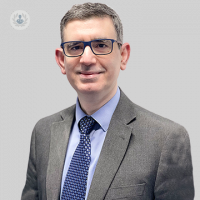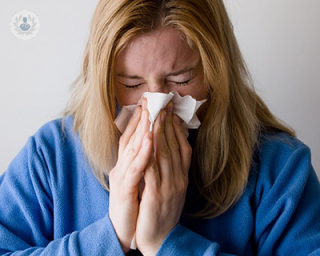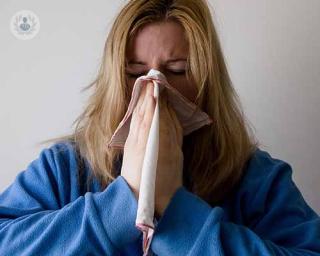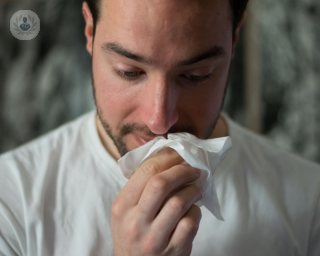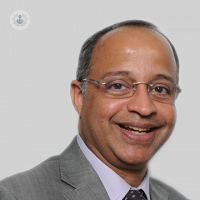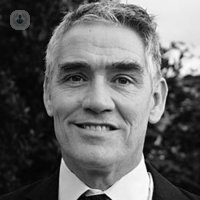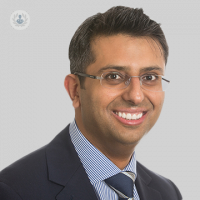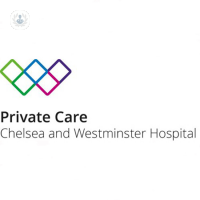Nasal polyps
Professor Vikas Malik - Otolaryngology / ENT
Created on: 11-13-2012
Updated on: 10-19-2023
Edited by: Conor Lynch
What are nasal polyps?
Nasal polyps are semi-transparent growths that can form in any part of the sino-nasal mucosa. These are benign, but they may grow to the extent that they obstruct the nasal cavities. This condition is also called polypoid sinusitis. The polyps can develop at different sites in the cavities, but usually new ones develop further inwards, most typically on the roof and sides of the nasal cavities.
Nasal polyps can be treated by an ENT specialist.
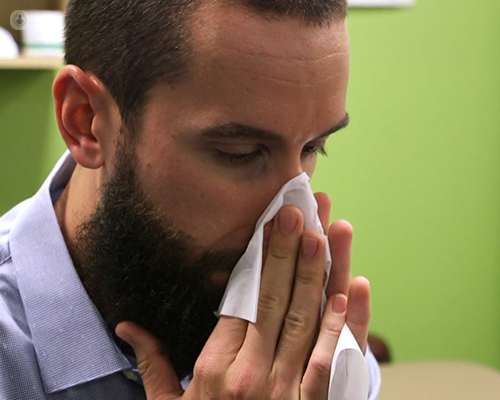
What are the symptoms of nasal polyps?
Symptoms of nasal polyps vary according to their size. Initially, sense of smell and taste may be muted, which can then be accompanied by partial or complete nasal obstruction. You may also experience a sensation of constant mucus, which does not improve even when you blow your nose.
The presence of multiple or very large polyps may cause:
- a runny nose
- snoring
- a sensation of pressure in the forehead
- headaches
What are the causes of nasal polyps?
The causes of nasal polyps are not fully understood, but we know that it has to do with inflammation of the mucous membrane of the nose and sinuses. It is thought that people who develop nasal polyps might have a different immune system response or differences in the chemical build-up of their mucous membrane. There are also suggested links with infection, severe untreated allergies, asthma, and cystic fibrosis. Polyps can develop at any age, though they are more common in young and middle-aged people.
Can nasal polyps be prevented?
Prevention consists of treating diseases like allergy or asthma and following the required treatments. In addition, it is important to avoid nasal irritations and to practice good hygiene via nasal washes. It may also be helpful to use a humidifier at home to moisturise the nasal cavities. If the problem is an allergy, use of antihistamines, nasal aerosols and/or an anti-allergy vaccination may help to prevent nasal polyps.
How are nasal polyps treated?
Medical treatment is recommended according to the grade of the polyps. It may consist of a topical corticosteroid, an oral corticosteroid and/or antibiotics if there is sign of infection. If there is no response to treatment, a surgical treatment is recommended, which consists of removal of the nasal polyps and the opening of the paranasal sinuses using endoscopic techniques.
Which specialist treats nasal polyps?
ENT surgeons are the specialists that treat nasal polyps.
What might happen if nasal polyps are left untreated?
Thankfully, nasal polyps are not generally a serious medical concern. They can, however, frequently block one's nose if left untreated.
How will I know if I have a cold or nasal polyps?
The main difference between a cold and nasal polyps is that colds tend to generally clear up within a few days, whereas nasal polyps do not clear up themselves without treatment.
When should I see a doctor for nasal polyps?
Patients are urged to see their GP as soon as possible if the notice any of the following symptoms:
- difficulty breathing
- changes to sense of smell
- symptoms are not improving
Should I go to a pharmacist if I have nasal polyps?
Patients who present with nasal polyps are typically advised to see a pharmacist after they have had a consultation with their GP. A pharmacist can recommend remedies to help treat nasal polyps, such as:
- steroid nasal sprays
- salt water washes
